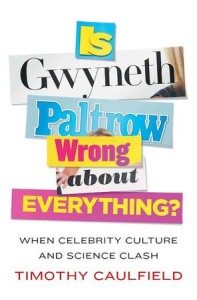 In the interests of full disclosure, I am not that keen on Gwyneth Paltrow as an actor, and I think she’s a fool as a human being. So, when I came across a book entitled Is Gwyneth Paltrow Wrong About Everything?, my instinctive answer was duh. Then I read the book, and found it to be a delight and an eye-opener, somewhere between solid social commentary and guilty pleasure.
In the interests of full disclosure, I am not that keen on Gwyneth Paltrow as an actor, and I think she’s a fool as a human being. So, when I came across a book entitled Is Gwyneth Paltrow Wrong About Everything?, my instinctive answer was duh. Then I read the book, and found it to be a delight and an eye-opener, somewhere between solid social commentary and guilty pleasure.
The author, Timothy Caulfield, certainly has the chops to write it. According to the book jacket, he is “a professor in the Faculty of Law and the School of Public Health as well as research director of the Health Law and Science Policy Group at the University of Alberta,” extensively involved in bioethics policy and research. He is also an ex-rocker and self-confessed junkie for popular culture; his research for this book took him from American Idol auditions (as an observer) to the spas of the rich and famous, and many other strange places, with frequently comic results. But no, he did not get to meet the divine Gwynnie.
In fact, IGPWAE is not, strictly speaking, about Gwyneth Paltrow so much as it is about the culture of celebrity—how the obscure majority are eager to follow the lead of rich, pretty people, many of whom have the scientific smarts of a baked potato, in matters of diet, lifestyle, and medical choices, up to and including whether to vaccinate one’s kids. Among other things, Caulfield provides an uncompromising evidence-based dismissal of the fad diets, the “detox” industry, the anti-aging creams and treatments, the myriad pseudoscientific paths to youth and beauty pushed by celebrities. And, boy, did I learn about some weird things.
Bird poop facials? Caffeinated underwear? Snail-slime beauty treatments, where for only $240, you can have snails fed exclusively on organic vegetables crawl over your face for a whole hour? Designer vulvas achieved through cosmetic surgery? There is, I swear, a chapter entitled “Pamela Anderson’s Breasts.” And so forth.
snails fed exclusively on organic vegetables crawl over your face for a whole hour? Designer vulvas achieved through cosmetic surgery? There is, I swear, a chapter entitled “Pamela Anderson’s Breasts.” And so forth.
However, Caulfield is neither cruel nor contemptuous. He looks beyond the glam tabloid-style presentation of celebrity to the human psychology behind both wanting to be famous, and wanting to follow famous people. The latter half of IGPWAE, indeed, is more buzz-kill than BuzzFeed, including an assessment of the astronomical odds against achieving celebrity, in the face of a cultural imperative to “follow the dream.”
So, is Gwyneth Paltrow wrong about everything? Well, my answer remains the same as before I read the book, only more so.
